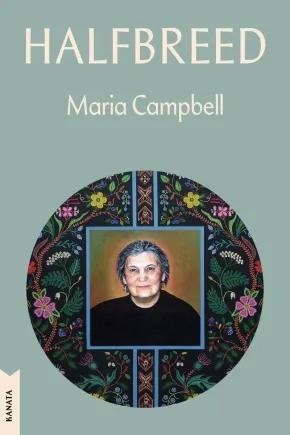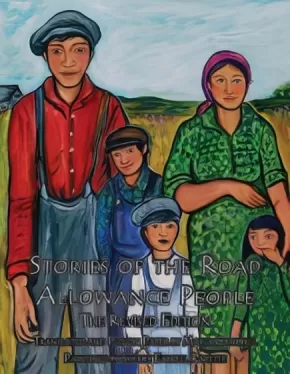Maria Campbell
Métis writer Maria Campbell is best known for her important memoir, Half-breed which initiated a rebirth of Indigenous literature in Canada. She was made an Officer of the Order of Canada in 2008. Campbell was born in 1940 in northwestern Saskatchewan on a trapline and grew up in a road-allowance community. The oldest of eight children, the young Maria had to leave her one-room country school to care for the other children when her mother died. At fifteen she left home and went to Vancouver. In her twenties she returned to the Prairies and became a community worker and organizer. Out of her city experience and with the help of a group she wrote Many Laws, a hand book explaining the laws and problems that confront First Nations people who move to the cities.
Campbell overcame many difficulties to take control of her own life and to help her people. This journey of self-discovery is traced in Half-breed, a moving account of a woman who struggled with poverty, alcoholism, drug addiction, sexual abuse and prostitution to reach thirty-three years of age and begin her healing process. Campbell tells her story in the context of Métis culture and a forgotten history. She brings in myth and creates a distinctive voice for a people ignored by mainstream society. This book has been used as a texts in countless university and college courses across North America and translated in Europe.
Maria Campbell went on to write three books for children: People of the Buffalo, Little Badger and the Fire Spirit , Riel's People which capture aspects of Métis history. In Stories of the Road-Allowance People, Campbell translated the narratives from the Cree-Mitchif language spoken by the Métis into oral English. She has used theatre to bring her Métis voice to large Canadian audiences. Her play Flight was the first all Aboriginal theatre production and included storytelling, drama, modern dance with Aboriginal arts. She wrote the play Jessica in collaboration with Linda Griffiths. The play follows the story of a young Métis woman from innocence to despair and finally to self-realization. It debuted in 1986 at Toronto's Theatre Passe Muraille and won the Dora Mavor Moore Award. At the Quinzanne International Festival in Quebec City, it won Best Canadian Production. Campbell and Griffiths published the play in The book of Jessica: A Theatrical Transformation, which also includes the story of its collaborative creation. Campbell's script The Red Dress is a film for the National Film Board. Between 1985 and 1997 she produced thirty-four community film documentaries and a weekly Aboriginal TV series, My Partner, My People.
Maria Campbell earned an M.A. in Native Studies from the University of Saskatchewan. She has received honourary doctorates from the University of Regina, York University, and Athabasca University. She has taught Métis history and the study of oral traditions at universities in Saskatchewan, Manitoba and Alberta. She is a visiting academic at the Centre for World Indigenous Knowledge and Research, Athabasca University. (Joseph J. Pivato, 2009)
Books (2)
Synopsis:
A new, fully restored edition of the essential Canadian classic.
An unflinchingly honest memoir of her experience as a Métis woman in Canada, Maria Campbell's Halfbreed depicts the realities that she endured and, above all, overcame. Maria was born in Northern Saskatchewan, her father the grandson of a Scottish businessman and Métis woman--a niece of Gabriel Dumont whose family fought alongside Riel and Dumont in the 1885 Rebellion; her mother the daughter of a Cree woman and French-American man. This extraordinary account, originally published in 1973, bravely explores the poverty, oppression, alcoholism, addiction, and tragedy Maria endured throughout her childhood and into her early adult life, underscored by living in the margins of a country pervaded by hatred, discrimination, and mistrust. Laced with spare moments of love and joy, this is a memoir of family ties and finding an identity in a heritage that is neither wholly Indigenous or Anglo; of strength and resilience; of indominatable spirit.
This edition of Halfbreed includes a new introduction written by Indigenous (Métis) scholar Dr. Kim Anderson detailing the extraordinary work that Maria has been doing since its original publication 46 years ago, and an afterword by the author looking at what has changed, and also what has not, for Indigenous people in Canada today. Restored are the recently discovered missing pages from the original text of this groundbreaking and significant work.
Educator & Series Information
This book is part of the Kanata Classics series, which celebrates timeless books that reflect the rich and diverse range of voices in Canadian literature.
Additional Information
224 pages | 5.50" x 8.23" | Paperback
Synopsis:
A new, fully restored edition of the essential Canadian classic.
An unflinchingly honest memoir of her experience as a Métis woman in Canada, Maria Campbell's Halfbreed depicts the realities that she endured and, above all, overcame. Maria was born in Northern Saskatchewan, her father the grandson of a Scottish businessman and Métis woman--a niece of Gabriel Dumont whose family fought alongside Riel and Dumont in the 1885 Rebellion; her mother the daughter of a Cree woman and French-American man. This extraordinary account, originally published in 1973, bravely explores the poverty, oppression, alcoholism, addiction, and tragedy Maria endured throughout her childhood and into her early adult life, underscored by living in the margins of a country pervaded by hatred, discrimination, and mistrust. Laced with spare moments of love and joy, this is a memoir of family ties and finding an identity in a heritage that is neither wholly Indigenous or Anglo; of strength and resilience; of indominatable spirit.
This edition of Halfbreed includes a new introduction written by Indigenous (Métis) scholar Dr. Kim Anderson detailing the extraordinary work that Maria has been doing since its original publication 46 years ago, and an afterword by the author looking at what has changed, and also what has not, for Indigenous people in Canada today. Restored are the recently discovered missing pages from the original text of this groundbreaking and significant work.
Additional Information
224 pages | 5.21" x 7.99"
Teen Books (1)
Synopsis:
Maria Campbell’s highly-acclaimed Stories of the Road Allowance People is the quintessential collection of traditional Michif stories. Since it was first published in 1995, this treasured resource has given voice to Métis Elders and has informed both Métis and non-Métis about the traditional Michif worldview. The Gabriel Dumont Institute is honoured to offer this invaluable book in a new edition. With a new story and introduction by Maria Campbell, new artwork by Sherry Farrell Racette and a narration component in English and in Michif, Stories of the Road Allowance People provides readers with poignant retellings of Michif traditional stories handed down from lii vyeu—the Old People.









